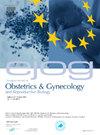Use of anakinra during pregnancy and breastfeeding in women with recurrent pericarditis: A case series
IF 1.9
4区 医学
Q2 OBSTETRICS & GYNECOLOGY
European journal of obstetrics, gynecology, and reproductive biology
Pub Date : 2025-06-27
DOI:10.1016/j.ejogrb.2025.114553
引用次数: 0
Abstract
Introduction
Recurrent pericarditis poses significant challenges in pregnant and breastfeeding women, requiring treatments that balance maternal health with fetal safety. Anakinra is a recombinant form of natural occurring human interleukin-1 receptor antagonist, and is effective in managing recurrent pericarditis resistant to standard therapies. However, limited data exist on its safety during conception, pregnancy, and lactation, partly due to the rarity of systemic autoinflammatory diseases and exclusion of reproductive-age women from trials.
Methods
Women with idiopathic, colchicine-resistant, corticosteroid-dependent recurrent pericarditis treated with anakinra during pregnancy were analyzed. Data included maternal age, medical history, pregnancy outcomes, delivery details, adverse events, and neonatal health, including APGAR scores, birth weight, congenital abnormalities, and breastfeeding outcomes.
Results
Fourteen women were treated with anakinra during pregnancy, leading to 17 newborns and two early abortions. Maternal and neonatal outcomes were favorable, with no complications or adverse effects during pregnancy. There were no congenital anomalies or neonatal infections. Eleven babies were breastfed while mothers continued anakinra without adverse effects. Recurrences of pericarditis occurred during nine pregnancies, easily managed with dose adjustments.
Conclusion
Anakinra appears to be a viable treatment for recurrent pericarditis in pregnant and breastfeeding women with recurrent pericarditis when conventional therapies fail. While current evidence supports its safety and efficacy, further studies are essential to establish comprehensive treatment guidelines. Multidisciplinary management is important to optimize maternal and neonatal outcomes.
复发性心包炎妇女在妊娠和哺乳期间使用阿那白:一个病例系列
反复发作的心包炎对孕妇和哺乳期妇女构成重大挑战,需要兼顾产妇健康和胎儿安全的治疗。Anakinra是一种重组形式的天然存在的人白细胞介素-1受体拮抗剂,并有效地管理复发性心包炎抵抗标准治疗。然而,关于其在受孕、妊娠和哺乳期间的安全性的数据有限,部分原因是全身性自身炎症疾病的罕见性以及将育龄妇女排除在试验之外。方法对妊娠期特发性、秋水珠碱耐药、皮质激素依赖的复发性心包炎妇女进行分析。数据包括产妇年龄、病史、妊娠结局、分娩细节、不良事件和新生儿健康,包括APGAR评分、出生体重、先天性异常和母乳喂养结局。结果14例孕妇在妊娠期使用阿那白,导致17例新生儿和2例早期流产。产妇和新生儿结局良好,妊娠期间无并发症或不良反应。无先天性异常或新生儿感染。11名婴儿被母乳喂养,同时母亲继续服用阿那白,没有不良反应。心包炎的复发发生在9个怀孕期间,很容易管理与剂量调整。结论anakinra是治疗妊娠期和哺乳期复发性心包炎无效的一种可行的治疗方法。虽然目前的证据支持其安全性和有效性,但需要进一步的研究来建立全面的治疗指南。多学科管理对于优化孕产妇和新生儿结局非常重要。
本文章由计算机程序翻译,如有差异,请以英文原文为准。
求助全文
约1分钟内获得全文
求助全文
来源期刊
CiteScore
4.60
自引率
3.80%
发文量
898
审稿时长
8.3 weeks
期刊介绍:
The European Journal of Obstetrics & Gynecology and Reproductive Biology is the leading general clinical journal covering the continent. It publishes peer reviewed original research articles, as well as a wide range of news, book reviews, biographical, historical and educational articles and a lively correspondence section. Fields covered include obstetrics, prenatal diagnosis, maternal-fetal medicine, perinatology, general gynecology, gynecologic oncology, uro-gynecology, reproductive medicine, infertility, reproductive endocrinology, sexual medicine and reproductive ethics. The European Journal of Obstetrics & Gynecology and Reproductive Biology provides a forum for scientific and clinical professional communication in obstetrics and gynecology throughout Europe and the world.

 求助内容:
求助内容: 应助结果提醒方式:
应助结果提醒方式:


